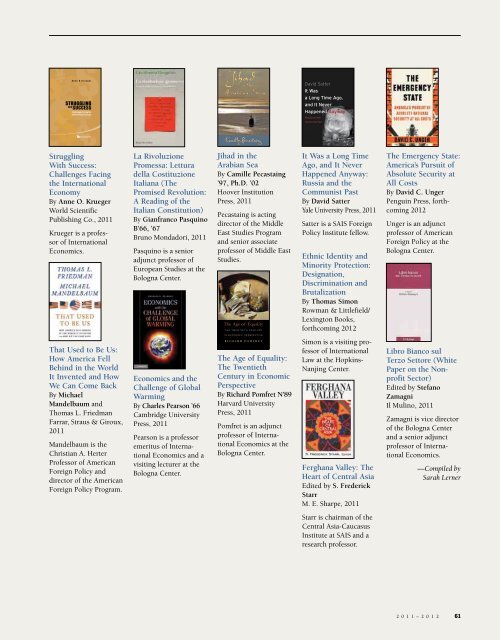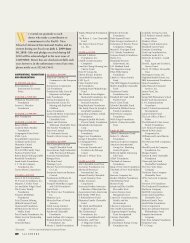Download Current Issue - SAIS
Download Current Issue - SAIS
Download Current Issue - SAIS
Create successful ePaper yourself
Turn your PDF publications into a flip-book with our unique Google optimized e-Paper software.
€£¥<br />
$<br />
n, by which is meant the increasing<br />
erdependence among nations, has been a<br />
ient in enabling enormous improvement<br />
condition. While progress has not always<br />
, and has not come without dislocation<br />
e economic policy challenge has been,<br />
able the realization of the large potential<br />
balization while simultaneously reducing<br />
side effects and providing safety nets for<br />
lives are disrupted in the process.<br />
ocuses on the successes of globalization,<br />
the main economic policy challenges and<br />
t arise to enhance the benefits and lower<br />
overs different aspects of globalization,<br />
ebt restructuring, development of the<br />
tor and financial crises in Asia, Turkey,<br />
e final part of the book covers multilateral<br />
organizations, namely the World Trade<br />
, the IMF and the World Bank.<br />
scientific.com<br />
$<br />
€<br />
STRUGGLING<br />
WITHSUCCESS<br />
Challenges Facing the<br />
International Economy<br />
ISBN-13 978-981-4374-31-6<br />
ISBN-10 981-4374-31-8<br />
STRUGGLING WITH<br />
£<br />
SUCCESS<br />
Krueger<br />
¥<br />
£<br />
$<br />
Anne O Krueger<br />
¥<br />
STRUGGLING<br />
WITHSUCCESS<br />
$ £<br />
Challenges Facing the<br />
International Economy<br />
World Scientific<br />
Struggling<br />
With Success:<br />
Challenges Facing<br />
the International<br />
Economy<br />
By Anne O. Krueger<br />
World Scientific<br />
Publishing Co., 2011<br />
Krueger is a professor<br />
of International<br />
Economics.<br />
That Used to Be Us:<br />
How America Fell<br />
Behind in the World<br />
It Invented and How<br />
We Can Come Back<br />
By Michael<br />
Mandelbaum and<br />
Thomas L. Friedman<br />
Farrar, Straus & Giroux,<br />
2011<br />
Mandelbaum is the<br />
Christian A. Herter<br />
Professor of American<br />
Foreign Policy and<br />
director of the American<br />
Foreign Policy Program.<br />
in Addis Ababa in 1995 to the double US<br />
embassy bombing in the summer of 1998,<br />
as well as examining the preparation and<br />
execution of the naval terrorism attacks.<br />
In addition, Pecastaing discusses how the<br />
state of lawlessness in Somalia has led to<br />
the rise of piracy in the western Indian<br />
Ocean, offering a brief narration of the<br />
most spectacular hijackings.<br />
For foreign powers, Pecastaing concludes,<br />
the Horn of Africa is a conundrum. The<br />
strategic risk is mitigated by the logistic<br />
limitations of the local outfits and their<br />
lack of capacity to project power outside<br />
the region. The costs of trying to impose<br />
law and order most certainly outweigh<br />
the benefits, as least in financial terms.<br />
As long as local violence does not make<br />
too much of a splash in the global media,<br />
foreign governments will continue to look<br />
the other way. But with Yemen on the<br />
brink of civil war following the events of<br />
the Arab Spring, the region is calling for<br />
foreign intervention.<br />
Cover Image:<br />
DVIDS photo by Petty Officer 2nd Class Jason S. Fariss<br />
Cover Design:<br />
Jennifer Navarrette<br />
Straits of Trouble<br />
The Bab el-Mandeb, which separates the Red Sea from the<br />
Indian Ocean and joins Africa and Asia, has provided a key<br />
Eurasian trade route for at least the past 2,500 years. But the<br />
lands and coasts across the Bab el-Mandeb have for centuries<br />
had a forbidding reputation as lands of piracy and privation.<br />
In Jihad in the Arabian Sea, Camille Pecastaing examines<br />
the twenty-first-century challenges facing this troubled and<br />
treacherous region.<br />
Pecastaing looks at the past and present of the key players in<br />
the area, including Somalia, Yemen, Eritrea, Djibouti, the Sudan,<br />
and Ethiopia; he discusses the tumultuous events of the Arab<br />
Spring of 2011 and reviews the terrorist activities of Al Qaeda,<br />
the state of lawlessness that has led to the rise of piracy in the<br />
western Indian Ocean, the rise of the radical Shabab group, and<br />
the spread of extremist forms of Islam in the south. The author<br />
displays a real feel for the land, seamlessly blending history and<br />
current headlines to paint a picture of a region that, for most of<br />
the past two thousand years, has never quite evolved into the<br />
era of the modern state.<br />
About the Author<br />
Camille Pecastaing is a senior associate professor of Middle East<br />
studies at the Paul H. Nitze School of Advanced International<br />
Studies at Johns Hopkins University. His areas of expertise<br />
include social history, behavioral sociology, and comparative<br />
politics.<br />
Hoover Institution Press<br />
Stanford University<br />
Stanford, California 94305-6010<br />
www.hooverpress.org<br />
Hoover<br />
Institution<br />
Press<br />
Political Science/Political Freedom & Security/<br />
International Security<br />
La Rivoluzione<br />
Promessa: Lettura<br />
della Costituzione<br />
Italiana (The<br />
Promised Revolution:<br />
A Reading of the<br />
Italian Constitution)<br />
By Gianfranco Pasquino<br />
B’66, ’67<br />
Bruno Mondadori, 2011<br />
Pasquino is a senior<br />
adjunct professor of<br />
European Studies at the<br />
Bologna Center.<br />
Pecastaing<br />
Jihad in the Arabian Sea<br />
Hoover<br />
Institution<br />
Press<br />
Jihad in the<br />
Arabian Sea<br />
Camille Pecastaing<br />
Jihad in the Arabian Sea Final.indd 1 7/12/11 4:20 PM<br />
Economics and the<br />
Challenge of Global<br />
Warming<br />
By Charles Pearson ’66<br />
Cambridge University<br />
Press, 2011<br />
Pearson is a professor<br />
emeritus of International<br />
Economics and a<br />
visiting lecturer at the<br />
Bologna Center.<br />
Jihad in the<br />
Arabian Sea<br />
By Camille Pecastaing<br />
’97, Ph.D. ’02<br />
Hoover Institution<br />
Press, 2011<br />
Pecastaing is acting<br />
director of the Middle<br />
East Studies Program<br />
and senior associate<br />
professor of Middle East<br />
Studies.<br />
the age of equality<br />
the twentieth century<br />
in economic perspective<br />
richard pomfret<br />
The Age of Equality:<br />
The Twentieth<br />
Century in Economic<br />
Perspective<br />
By Richard Pomfret N’89<br />
Harvard University<br />
Press, 2011<br />
Pomfret is an adjunct<br />
professor of International<br />
Economics at the<br />
Bologna Center.<br />
A<br />
t the dawn of the twenty-first<br />
century, the challenges for the countries<br />
on the shores of the Arabian Sea are<br />
many: civil war, piracy, radical Islamism,<br />
transnational terrorism, and a real risk of<br />
environmental and economic failure on<br />
both sides of the Bab el-Mandeb strait.<br />
Yet its strategic importance as a conduit<br />
for maritime trade between Asia and<br />
the Mediterranean world is as great as<br />
it was when Egyptian pharaohs built a<br />
canal between the Nile and the Red Sea.<br />
Today, as then, the lands around the Bab<br />
el-Mandeb are as difficult to pacify as the<br />
Red Sea was treacherous to navigate.<br />
In Jihad in the Arabian Sea, Camille<br />
Pecastaing leads us through the history<br />
and geography of the region, illuminating<br />
the tests it faces today. He describes<br />
the collapse of the Somali state under<br />
Siad Barre in the 1980s and details the<br />
struggle between the warlord Aideed and<br />
the UN and US forces in the early 1990s.<br />
He outlines the history of modern Yemen, Russia and the<br />
from the civil war of the 1960s to the<br />
reunification process. And he reviews the<br />
activity of Al Qaeda in the region, from Communist Past<br />
the assassination attempt against Mubarak<br />
Continued on back flap<br />
David Satter<br />
It Was<br />
a Long Time Ago,<br />
and It Never<br />
Happened Anyway<br />
It Was a Long Time<br />
Ago, and It Never<br />
Happened Anyway:<br />
Russia and the<br />
Communist Past<br />
By David Satter<br />
Yale University Press, 2011<br />
Satter is a <strong>SAIS</strong> Foreign<br />
Policy Institute fellow.<br />
Ethnic Identity and<br />
Minority Protection:<br />
Designation,<br />
Discrimination and<br />
Brutalization<br />
By Thomas Simon<br />
Rowman & Littlefield/<br />
Lexington Books,<br />
forthcoming 2012<br />
Simon is a visiting professor<br />
of International<br />
Law at the Hopkins-<br />
Nanjing Center.<br />
Ferghana Valley: The<br />
Heart of Central Asia<br />
Edited by S. Frederick<br />
Starr<br />
M. E. Sharpe, 2011<br />
Starr is chairman of the<br />
Central Asia-Caucasus<br />
Institute at <strong>SAIS</strong> and a<br />
research professor.<br />
The Emergency State:<br />
America’s Pursuit of<br />
Absolute Security at<br />
All Costs<br />
By David C. Unger<br />
Penguin Press, forthcoming<br />
2012<br />
Unger is an adjunct<br />
professor of American<br />
Foreign Policy at the<br />
Bologna Center.<br />
Libro Bianco sul<br />
Terzo Settore (White<br />
Paper on the Nonprofit<br />
Sector)<br />
Edited by Stefano<br />
Zamagni<br />
Il Mulino, 2011<br />
Zamagni is vice director<br />
of the Bologna Center<br />
and a senior adjunct<br />
professor of International<br />
Economics.<br />
—Compiled by<br />
Sarah Lerner<br />
2011–2012 61



